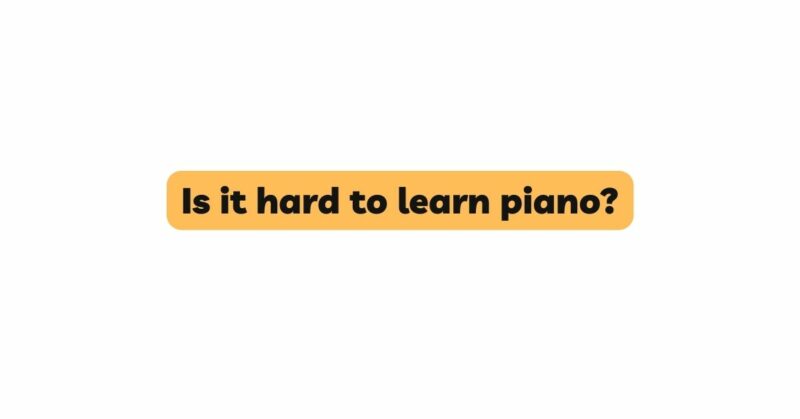Learning to play the piano can be a rewarding experience, but it is important to be realistic about how difficult it will be. There is no one-size-fits-all answer to this question, as the difficulty of learning piano will vary depending on a number of factors, including:
- Your age: Younger children may be able to learn piano more easily than adults, as they have more time and energy to dedicate to practice. However, it is never too late to start learning piano.
- Your natural aptitude for music: Some people have a natural aptitude for music and may be able to learn piano more easily than others. However, even if you do not have a natural aptitude for music, you can still learn to play the piano with hard work and dedication.
- Your practice schedule: The more you practice, the easier it will be to learn piano. However, it is important to find a practice schedule that works for you and that you can stick to. Aim to practice for at least 30 minutes a day, 5 days a week.
- Your resources: There are many resources available to help you learn piano, including books, online courses, and apps. Make sure to choose resources that are appropriate for your level and that will help you progress at a steady pace.
- Your motivation: If you are motivated to learn piano, you will more likely to stick with it and make progress.
- Your dedication: Learning piano takes time and effort. If you are dedicated to practicing regularly, you will learn more easily.
- Your attitude: If you have a positive attitude and believe that you can learn piano, you will be more likely to succeed.
In general, it is considered to be a moderately difficult instrument to learn. However, with the right resources and dedication, anyone can learn to play the piano.
Here are some tips for learning piano:
- Start with the basics: Before you start learning songs, it is important to learn the basics of piano playing, such as reading music, playing scales, and learning basic chords. There are many resources available to help you learn the basics of piano playing.
- Set realistic goals: When you are learning piano, it is important to set realistic goals for yourself. Don’t expect to become a concert pianist overnight. Start with small goals, such as learning a new scale or practicing a difficult passage. As you progress, you can set more challenging goals.
- Find a good practice routine: It is important to find a practice routine that works for you and that you can stick to. Aim to practice for at least 30 minutes a day, 5 days a week.
- Use a variety of resources: There are many resources available to help you learn piano, including books, online courses, and apps. Use a variety of resources to find the ones that work best for you.
- Don’t be afraid to make mistakes: Everyone makes mistakes when they are learning something new. The important thing is to learn from your mistakes and keep practicing.
- Have fun! Learning to play the piano should be enjoyable. If you are not having fun, you are less likely to stick with it. So relax, take your time, and enjoy the process.
By following these tips, you can learn piano more easily and efficiently. Just remember to be patient and persistent, and to have fun!
Here are some additional factors that can affect how difficult it is for you to learn piano:
- Your goals: If you want to become a concert pianist, it will be more difficult to learn piano than if you just want to be able to play for your own enjoyment.
- Your teacher: If you have a good teacher, they can help you learn piano more easily.
- Your practice environment: If you have a quiet place to practice where you won’t be interrupted, you will be able to practice more effectively.
- Your health: If you are healthy and have good stamina, you will be able to practice for longer periods of time.
Ultimately, the difficulty of learning piano will depend on a variety of factors. However, if you are willing to put in the time and effort, you can learn to play the piano and enjoy it for many years to come.


